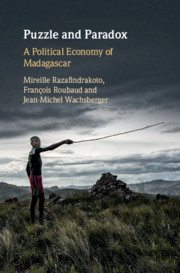Book contents
- Puzzle and Paradox
- Puzzle and Paradox
- Copyright page
- Contents
- Contents
- Tables
- Boxes
- Foreword
- Acknowledgements
- Abbreviations and Acronyms
- General Introduction
- 1 The Malagasy Mystery through the Lens of Economic Growth and Development Theories
- 2 Milestones for a Political Economy of Madagascar’s Trajectory
- 3 Structural Assets
- 4 Obstacles
- 5 Elites in Madagascar: A Sociography
- General Conclusion
- Timeline
- Glossary of Malagasy Terms
- References
- Index
General Conclusion
Published online by Cambridge University Press: 12 February 2020
- Puzzle and Paradox
- Puzzle and Paradox
- Copyright page
- Contents
- Contents
- Tables
- Boxes
- Foreword
- Acknowledgements
- Abbreviations and Acronyms
- General Introduction
- 1 The Malagasy Mystery through the Lens of Economic Growth and Development Theories
- 2 Milestones for a Political Economy of Madagascar’s Trajectory
- 3 Structural Assets
- 4 Obstacles
- 5 Elites in Madagascar: A Sociography
- General Conclusion
- Timeline
- Glossary of Malagasy Terms
- References
- Index
Summary
The general conclusion wraps up the main findings of the book highlighting its innovative approach to considering how Madagascar functions in order to understand the country’s trajectory since independence. It investigates the hybrid nature of contemporary Malagasy society, a mix of external and internal influences in fateful combination (a chimera), despite the conclusion that endogenous dynamics are leading the dance. Drawing on the most recent trends, the chapter elaborates three potential scenarios for the years to come. Chaos is not the least probable. The second is the road to a more positive societal change, by establishing sustainable coalitions among elites and more organised top-down patron-client system. This scenario would establish a stable social order, but would mean the abandonment of the democratic process. The third scenario called democratic consolidation would be achieved by means of an inclusive social, political and economic dynamic. Perhaps the most ambitious, it would build on Madagascar most positive assets: the institutional capacity for regulation demonstrated in the past, the taboo on violence and the democratic aspirations of the population. The only avenue is for Madagascar to consolidate countervailing institutions and develop intermediary bodies, and giving more voice to the people.
- Type
- Chapter
- Information
- Puzzle and ParadoxA Political Economy of Madagascar, pp. 233 - 245Publisher: Cambridge University PressPrint publication year: 2020



